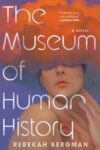Dear readers! Forgive the brevity of this week’s roundup of reading recommendations, if indeed you are an appreciator of sprawing length… And since I am at liberty to assume you like what I like, let’s say you are. (“What I assume you shall assume,” wrote Whitman, not to put myself in his shoes.)
My favorite piece this week was Julian Barnes‘ essay for the New York Times Review of Books called “For Sorrow There Is No Remedy.” Ostensibly, it’s a review of the new memoir by Joyce Carol Oates called A Widow’s Story, one work in a recent suite of what are being termed “widow memoirs” (Joan Didion’s The Year of Magical Thinking, published in 2005, was probably the first). But Barnes manages to take Oates’ work in all of its imperfections and use it, along with Didion’s memoir, as a case study in autobiographical expressions of grief, which are “unfalsifiable, and therefore unreviewable by any normal criteria. The book is repetitive? So is grief. The book is at times incoherent? So is grief.” Barnes doesn’t exonerate the memoir so much as observe, cannily and quite movingly, the crippling effect grief has on the attempt to represent it: “What it grief at times but a car crash of cliché?” Barnes’ memoir, called Nothing To Be Frightened Of, is an agnostic’s meditation on mortality; I think it makes sense to consider this essay as part of a larger project of understanding the place of death and grief in our culture, as well as its relation to literary expression.
I would say that Julian Barnes reads A Widow’s Story so we don’t have to (because who really wants to?), but Joyce Carol Oates came to me in a dream last night at an elaborate brunch buffet in my neighborhood in Western Massachusetts, her black eyes staring me down out of that gaunt face like some terrible wraith of my Whitmanian literary arrogance. What do I really know about widowhood or grief? Read Barnes on the subject so you don’t have to read me.
It was fun to read Janet Malcolm on “the cold war propaganda film” that is the reality series Sarah Palin’s Alaska in her essay “Special Needs,” also for the New York Review of Books. Malcolm is, among other things, probably the only living writer who could describe the effect of flash-forward monologues on reality TV programs as one of “oneiric unreality” – and gracefully, without irony. In her reading of the show:
The Palins travel in small planes into the tooth-and-claw wilderness to enact their allegory of unspoiled capitalism. …You don’t believe that what you are seeing happened in the way it is shown to have happened, any more than you think that the man in the Magritte was born with an apple attached to his face.
And yet she makes deft sense out of the political and emotions structures in a work by all accounts sounds incoherent (oneiric unreality, indeed) – which is to say, her reading goes farther than the elegant allusion to Magritte. It’s hardly Malcolm at her greatest, but it’s also satisfying to have her report back from the midst of a cultural phenomena I would prefer not to visit myself. I think I can safely say that Janet Malcolm watches Sarah Palin’s Alaska so we don’t have to, but if Palin starts showing up for brunch dates in my dreams then I quit the editorial biz.
In brief: Edmund White lists his top ten books about New York, featuring in the number one slot Anatole Broyard’s unfinished memoir Kafka Was The Rage, a great favorite of mine; the new Montreal Poetry Prize will award 50,000$ to a single winning poem in what is being described as “the biggest poetry competition in history”; Flavorwire has a little story about the epic love affair between distinguished performance artists Marina Abramović and Ulay, who performed their break-up by walking 2500 km of the Great Wall of China and, more recently, their reunion during Abramović’s piece The Artist is Present at MoMA in 2010.
This post may contain affiliate links.








